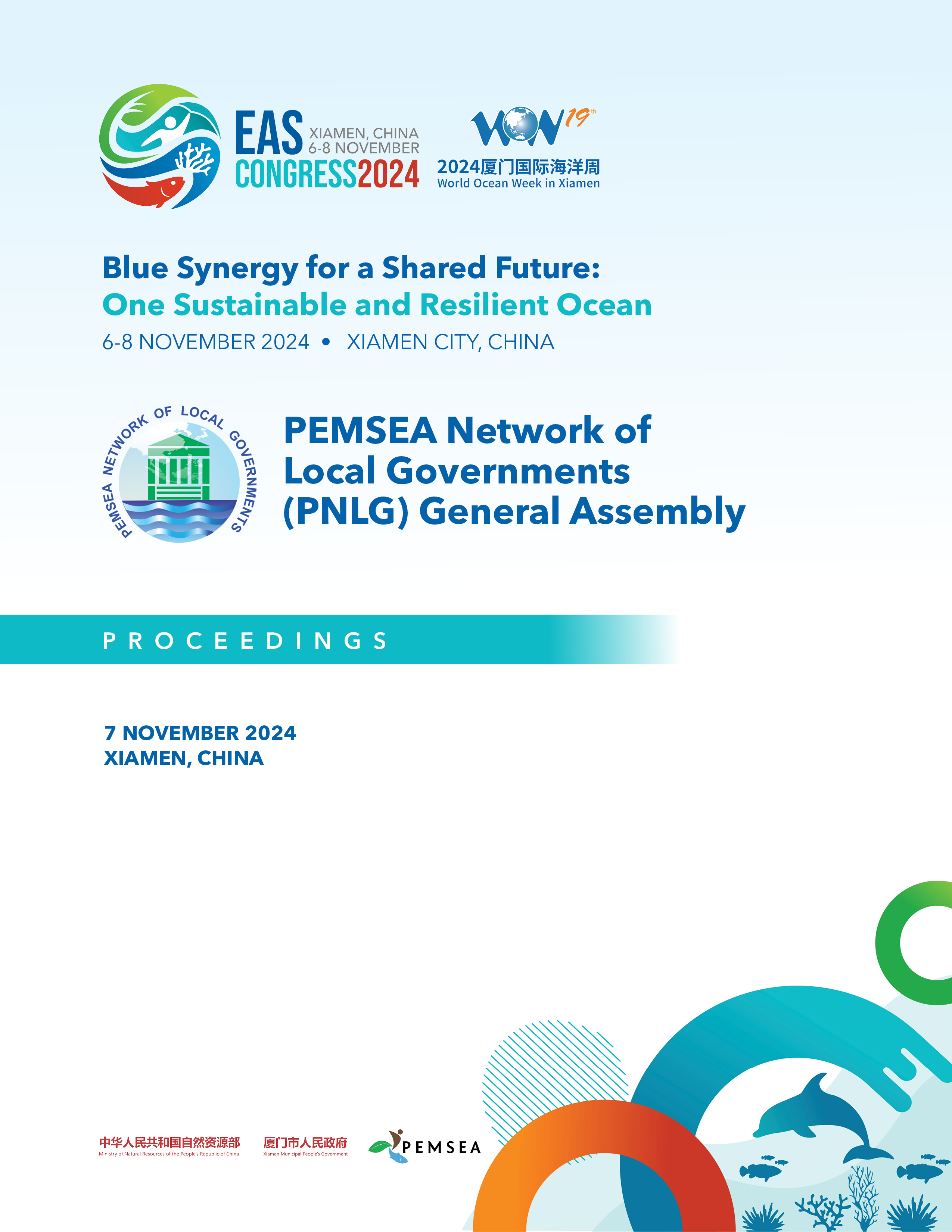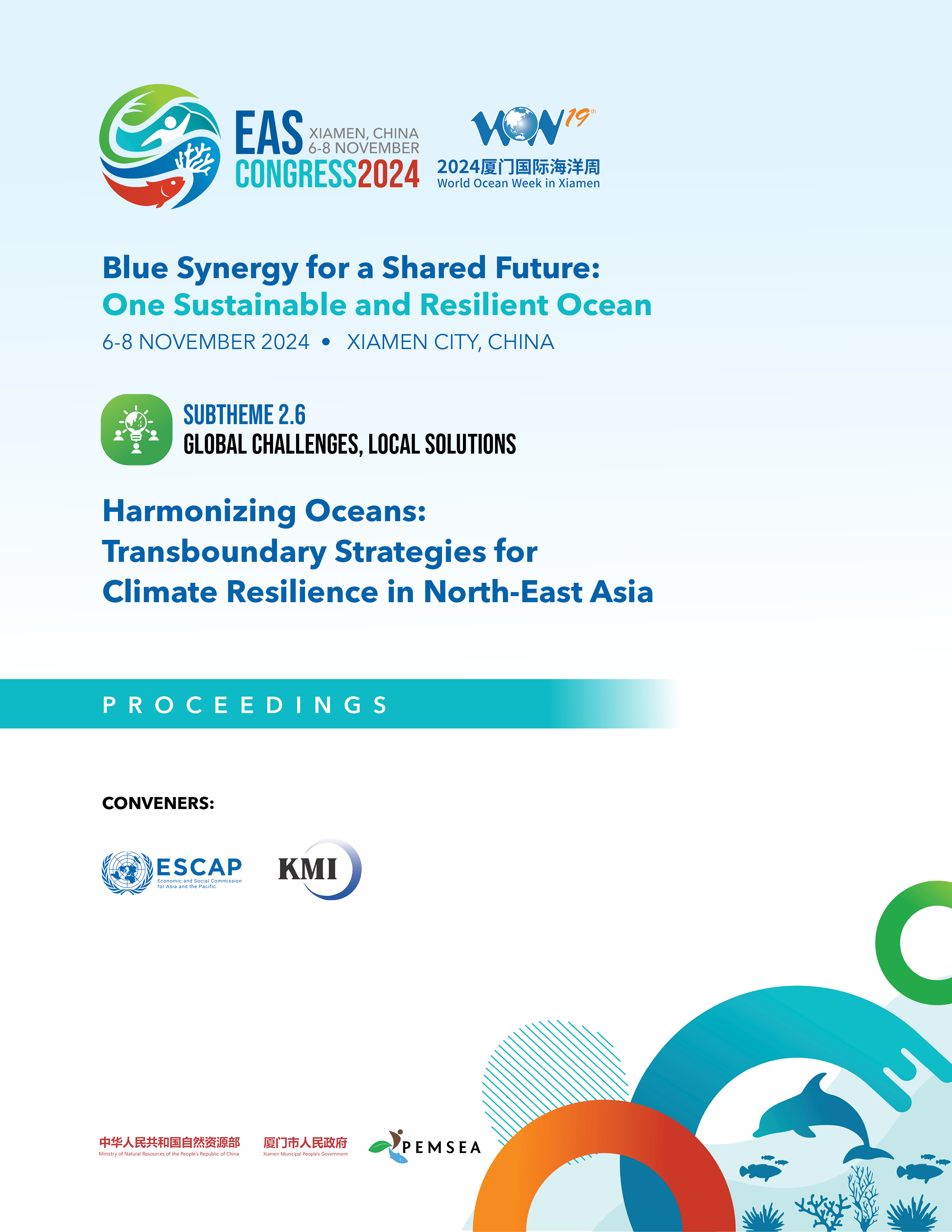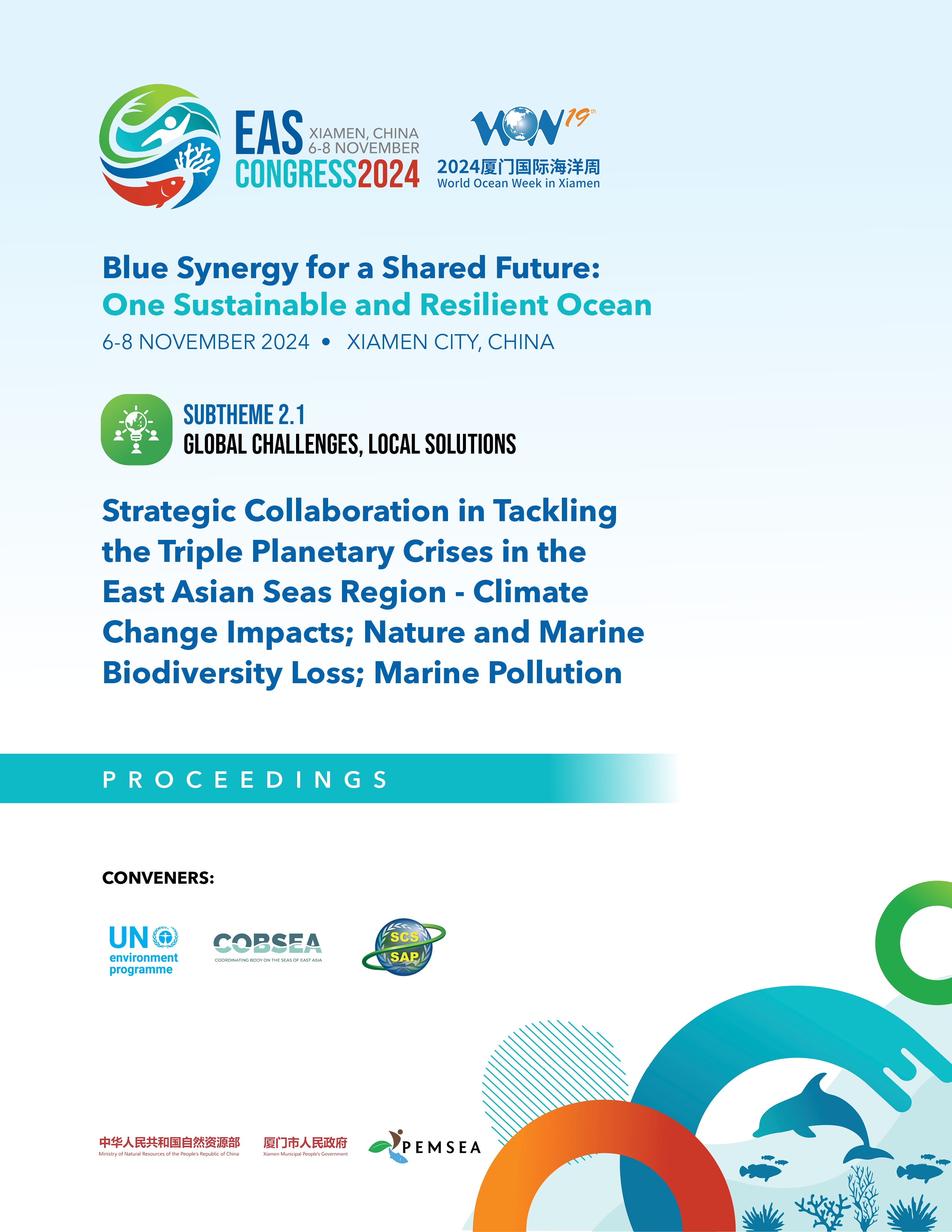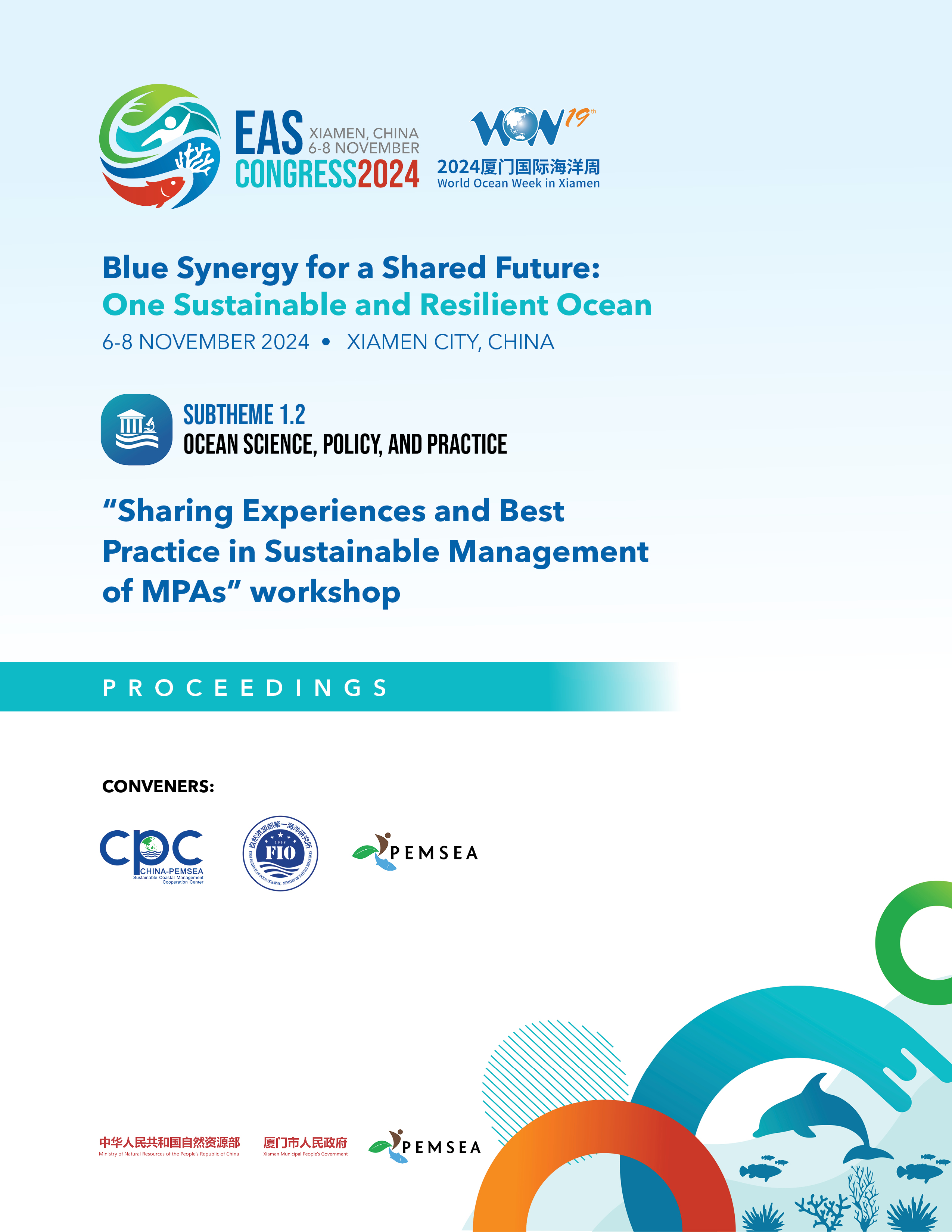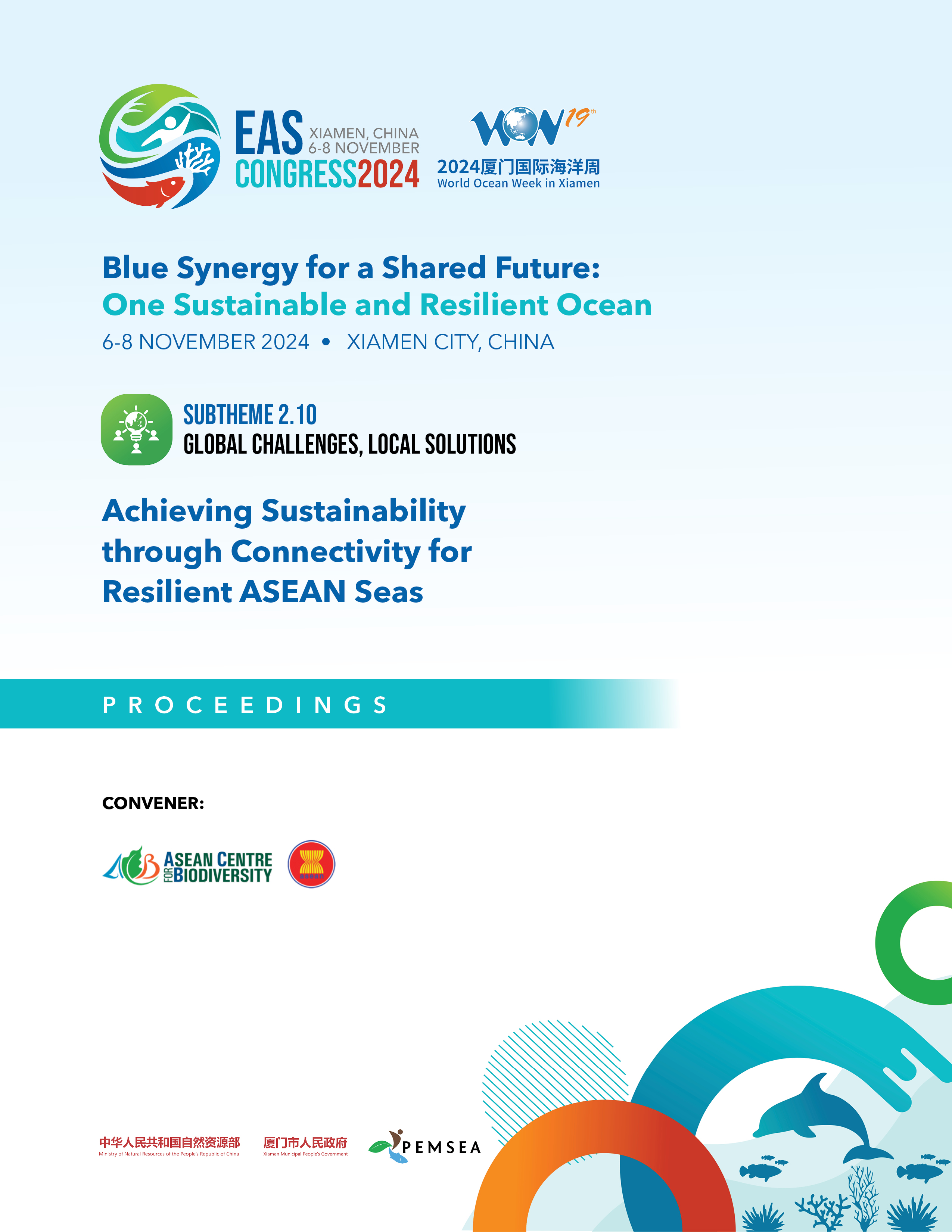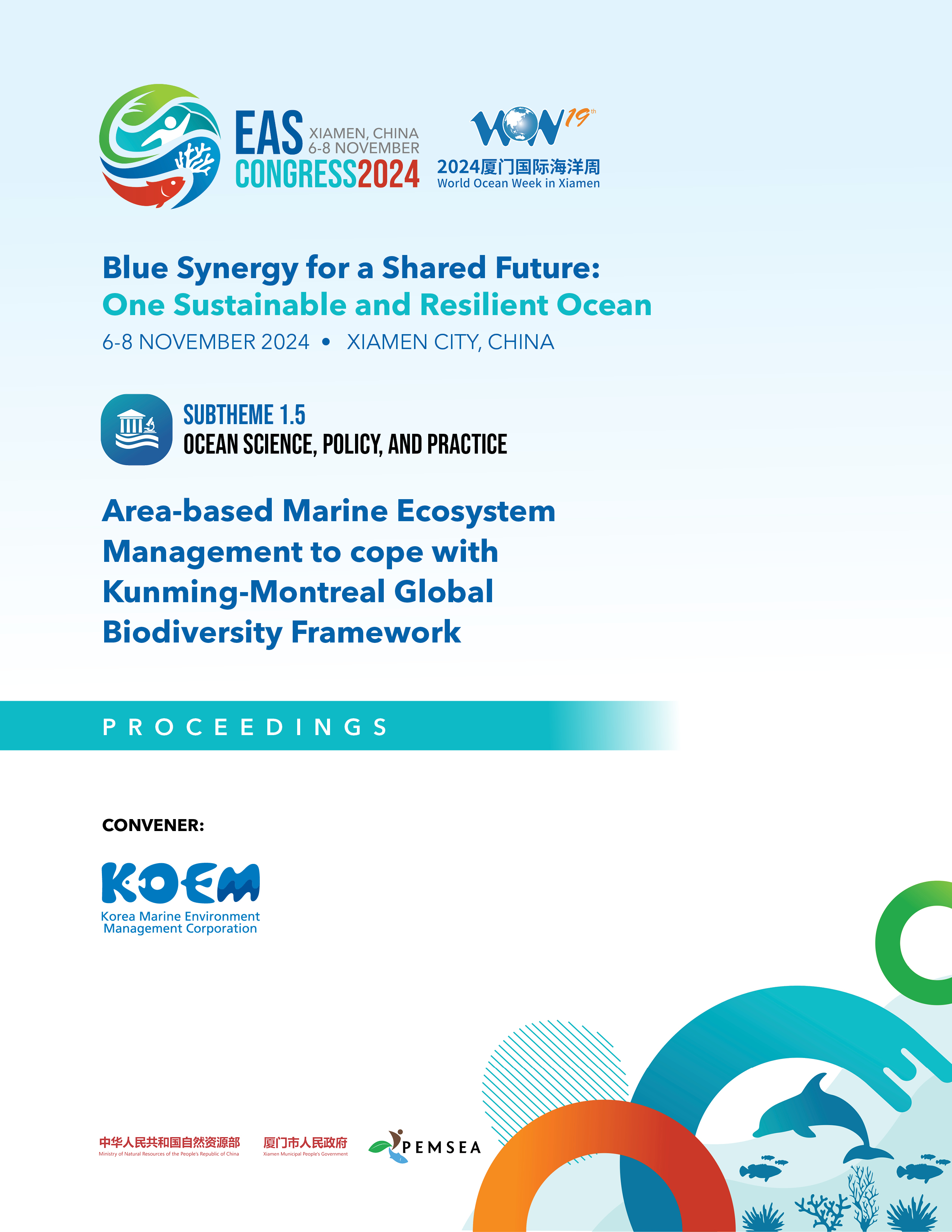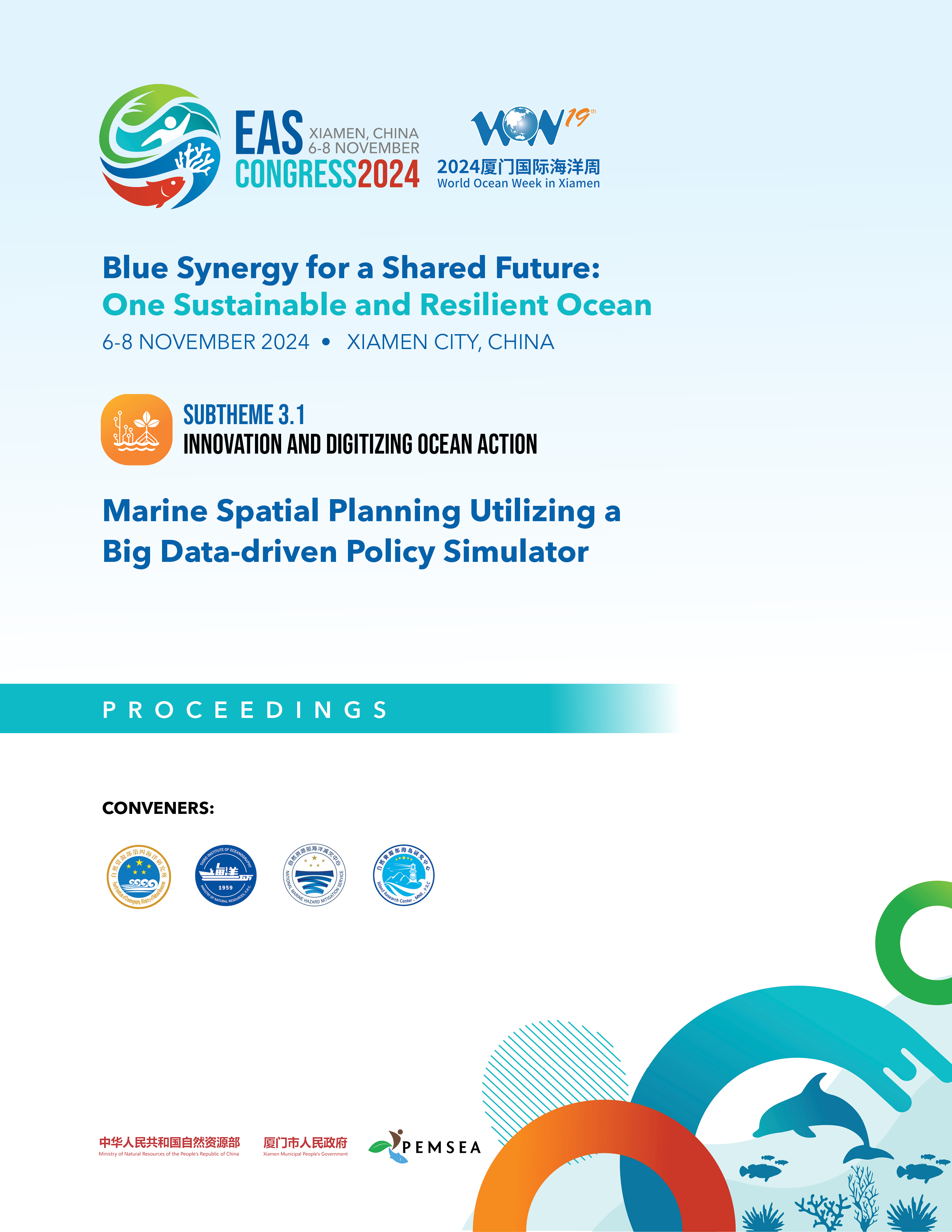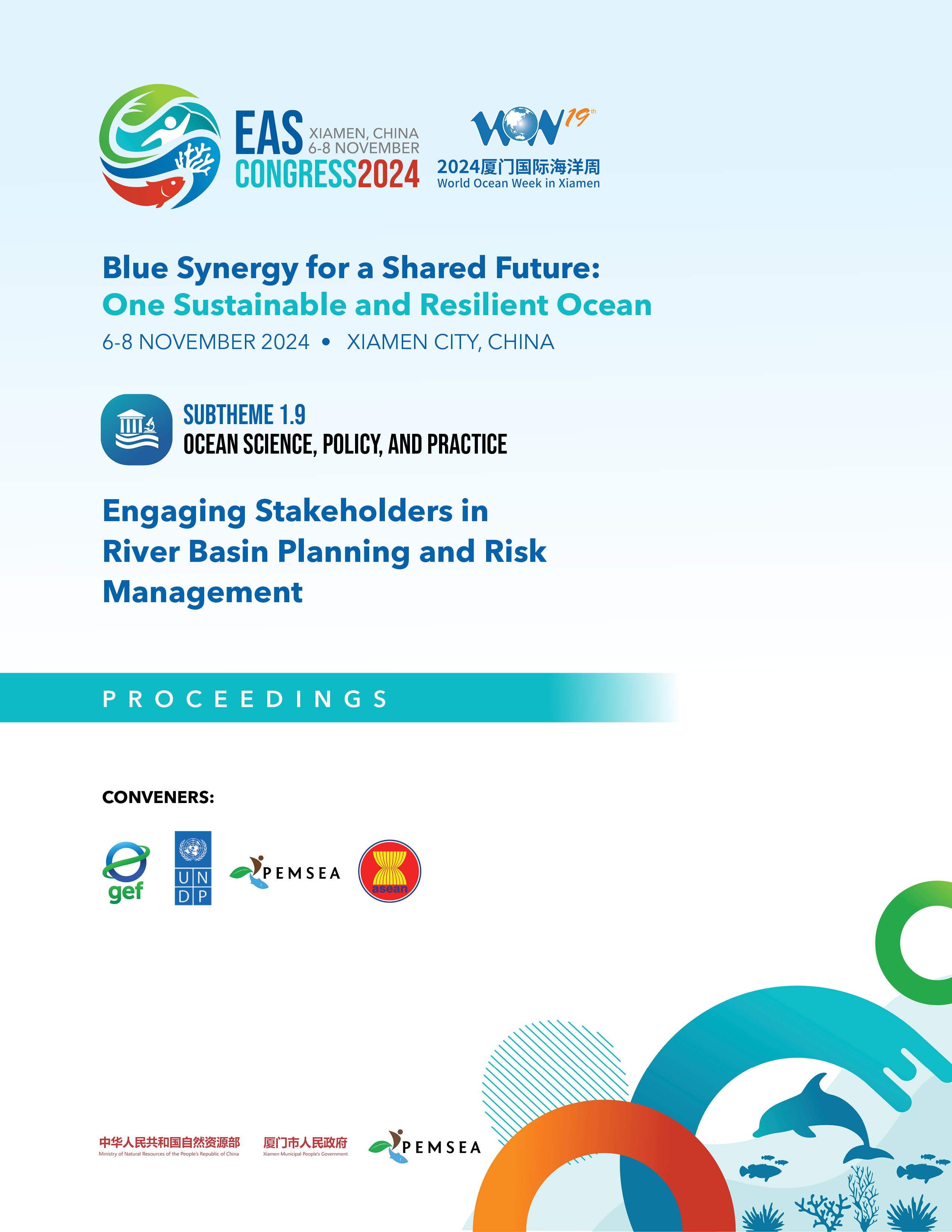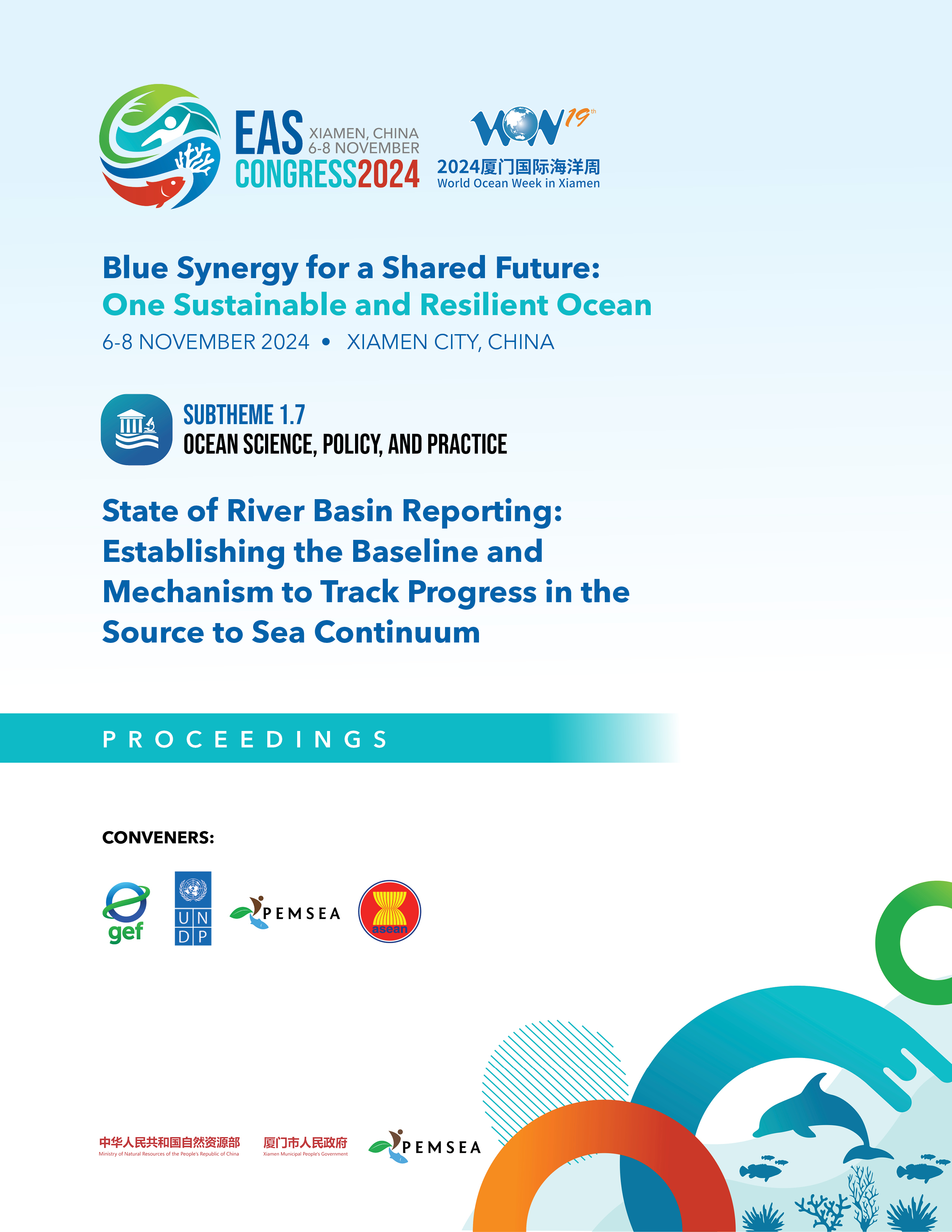
Breadcrumb
-
PEMSEA Network of Local Governments Forum (PNLG) 2024 Annual Forum Proceedings
The 2024 Forum of the PNLG with the theme, “Blue Synergy for a Shared Future: One Sustainable and Resilient Ocean” was hosted by PNLG and PEMSEA and co-organized by the PNLG Secretariat and Coastal and Ocean Management Institute (COMI) of Xiamen University. The forum was conducted on 6-8 November 2024 in Xiamen.
About one hundred participants from:
- 21 PNLG member local governments;
- 5 PNLG Associate members;
- PNLC members;
- resource speakers and other invited experts,
- the PNLG Secretariat,
- the PNLC Secretariat, and
- the PRF attended the forum.
They are from eight countries, namely Cambodia, China, Indonesia, Japan, Philippines, RO Korea, Timor-Leste and Viet Nam.
-
Harmonizing Oceans: Transboundary Strategies for Climate Resilience in North-East Asia
The Korea Maritime Institute (KMI) and ESCAP Subregional Office for
East and North-East Asia jointly organized a session titled “Harmonizing Oceans: Transboundary Strategies for Climate Resilience in North-East Asia”. This session highlighted the role of Marine Protected Areas (MPAs) under the Coastal and Marine Spatial
Planning (CSMP) regime in North-East Asia and beyond in fostering regional resilience against climate impacts and promoting ecosystem conservation.Key topics included:
- Understanding Climate Change Impacts: Examining how climate change affects marine ecosystems in this region.
- Applying CMSP Strategies: Sharing successful CMSP strategies and their role in climate-related conservation efforts (e.g., blue carbon, community-led habitat restoration).
- Enhancing Transboundary Cooperation: Discussing how multi-stakeholder engagement can strengthen regional conservation initiatives.
Additionally, the session underscored capacity building and knowledge exchange, providing a platform for member States and relevant stakeholders to share best practices and enhance skills for managing MPAs and addressing regional marine environmental challenges.
-
Strategic Collaboration in Tackling the Triple Planetary Crises in the East Asian Seas Region - Climate Change Impacts; Nature and Marine Biodiversity Loss; Marine Pollution
The world faces the Triple Planetary Crises (TPC)—climate change, biodiversity loss, and pollution—which require integrated solutions rather than isolated approaches. Some solutions may conflict with others, while well-designed strategies can address multiple crises simultaneously. Identifying synergies and trade-offs is essential for effective action.
East Asian Seas countries have committed to tackling these challenges through global and regional frameworks, including the SDGs, KM-GBF, UNFCCC, UNEA, and ASEAN initiatives. However, many marine and coastal projects in the region remain fragmented, lacking coordination and missing opportunities for collaboration. Strengthening partnerships can optimize resources, enhance impact, and avoid duplication of efforts.
This session focuses on the efforts of regional marine environmental institutions in promoting coordination and collaboration for the sustainable governance of the East Asian Seas region. The session brought together strategic partners and stakeholders, including PEMSEA, IUCN, IOC-WESTPAC, ASEAN Centre for Biodiversity, amongst others, to move towards a future where coordination and integration is standard.
-
Sharing Experiences and Best Practice in Sustainable Management of MPAs
The Sharing Experiences and Best Practice in Sustainable Management of MPAs workshop brought together over 60 marine conservation experts from East Asian Seas countries to enhance collaboration and exchange best practices in Marine Protected Areas (MPAs) and Other Effective Area-Based Conservation Measures (OECMs) management.
The workshop featured discussions on MPA network design, biodiversity conservation strategies, community-led enforcement, and the role of technology in marine protection. Experts shared insights on strengthening MPA effectiveness, addressing conservation gaps, and aligning efforts with the 30x30 global target.
A key highlight was the release of four significant studies on marine OECM criteria, MPA monitoring plans, patrol frameworks, and biodiversity conservation gaps. These reports provided valuable guidance for improving conservation planning and management across the region.
By fostering knowledge exchange and regional cooperation, the workshop contributed to advancing sustainable marine management in alignment with the Sustainable Development Strategy for the Seas of East Asia (SDS-SEA) 2023-2027).
-
Achieving Sustainability through Connectivity for Resilient ASEAN Seas
Marine conservation in ASEAN has lagged, with only 4% of marine areas protected—far below the 10% Aichi target. The Kunming-Montreal Global Biodiversity Framework (KM GBF) now calls for 30% protection by 2030, requiring stronger regional cooperation.
The ASEAN Centre for Biodiversity (ACB) is expanding marine protected areas (MPAs) and transboundary conservation through ecosystem-based management and marine spatial planning. To advance these efforts, ACB hosted the session “Achieving Sustainability through Connectivity for Resilient ASEAN Seas” at the EAS Congress 2024 on 6 November.
The session aimed to:
- Showcase ASEAN’s progress toward the 30x30 target.
- Exchange best practices in marine conservation.
- Highlight youth leadership in sustainability.
With participation from government officials, marine experts, NGOs, and youth, discussions emphasized ecological connectivity, inclusive governance, and collaboration. The event reinforced ASEAN’s commitment to ocean sustainability through regional solutions.
-
Area-based marine ecosystem management to cope with Kunming Montreal Global Biodiversity Framework
The session "Area-based Marine Ecosystem Management for the implementation of Kunming-Montreal Global Biodiversity Framework", held on November 7, 2024, in Xiamen, China, highlighted innovative strategies to advance marine biodiversity conservation across the East Asian Seas. By addressing the Kunming-Montreal targets, including the ambitious 30x30 objective, the session aligned seamlessly with the EAS Congress theme, "Connecting People and Ocean for Resilient and Sustainable Seas."
The event brought together policymakers, researchers, and key stakeholders to foster collaboration, exchange expertise, and explore actionable pathways toward resilient and thriving marine ecosystems. With its focus on regional implementation linked to global biodiversity and ocean sustainability goals, the session contributed meaningfully to SDG 14, reaffirming a shared commitment to safeguarding marine resources for future generations.
-
Marine Spatial Planning Utilizing a Big Data-driven Policy Simulator
The Marine Spatial Planning Utilizing a Big Data-driven Policy Simulator session addresses the increasing conflicts and overlaps in marine spatial utilization due to intensified activities. It aims to promote integrated marine space management that ensures sustainable and eco-friendly development. Experts from Korea, Japan, China, and Indonesia will share their knowledge on marine spatial management and discuss strategies for international cooperation. The session focuses on leveraging digital twin technology to simulate policy effects, contributing to the development of intelligent marine spatial policy tools for predicting activities and diagnosing policy impacts across the Asian region.
-
Engaging Stakeholders in River Basin Planning and Risk Management
The Regional Workshop served as a collaborative platform for engaging key stakeholders in advancing Integrated River Basin Management (IRBM) strategies across six ASEAN countries namely, Cambodia, Indonesia, Lao PDR, Malaysia, Philippines, and Vietnam. This workshop facilitated in-depth discussions on stakeholder dynamics, concerns, and engagement strategies tailored to the unique contexts of each country and their respective river basins. Key objectives included enhancing stakeholder participation in IRBM, and
identifying actionable strategies to improve stakeholder engagement in water resource management. -
State of River Basin Reporting: Establishing the Baseline and Mechanism to Track Progress in the Source to Sea Continuum
The conduct of baseline assessment of the Source-to-Sea (S2S) management continuum with a targeted outcome of improving understanding of governance, socioeconomic, ecological conditions, gaps and needs of priority river basins/sub-basins and associated
coastal areas through the State of River Basin (SORB) reporting system is one of the major outcomes of the implementation of the GEF/UNDP/ASEAN Project on Reducing Pollution and Preserving Environmental Flows in the East Asian Seas through the Implementation of Integrated River Basin Management (IRBM) in the ASEAN Countries. The SORB reporting system aims to:a) Establish baseline conditions in a river basin/associated coastal area prior to the startup of the IRBM program, including changes that are climate related;
b) Assess progress, achievements and shortcomings of ongoing IRBM programs by determining changing conditions with respect to governance and social and economic conditions, including gender gaps as well as trends and/or emerging environmental issues; and
c) Develop recommendations for continual improvement of IRBM programs including recommendations on ensuring gender responsiveness and incorporating gender equality, where appropriate for consideration by national and local governments and other relevant stakeholders in each river basin/coastal area.
